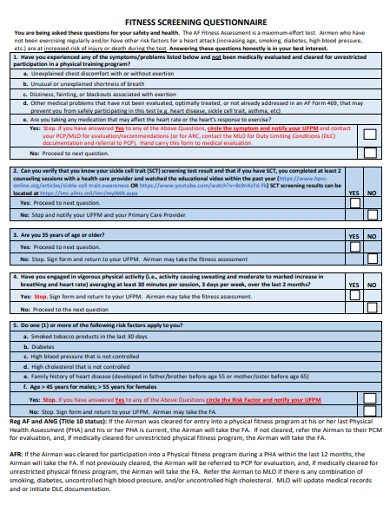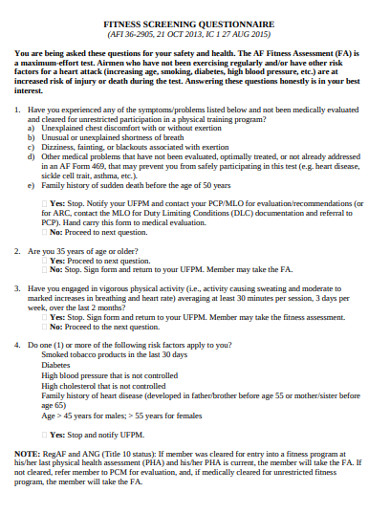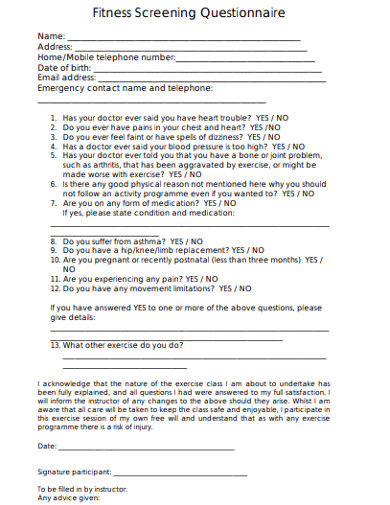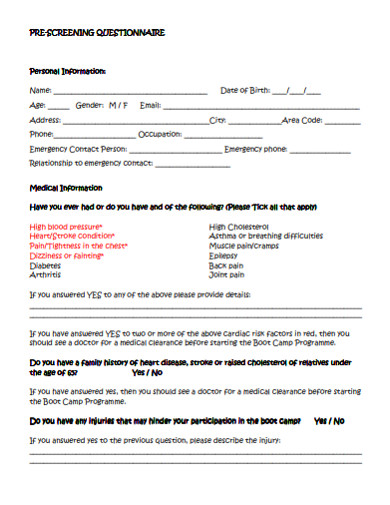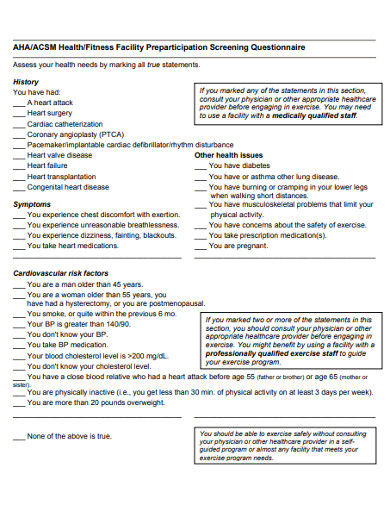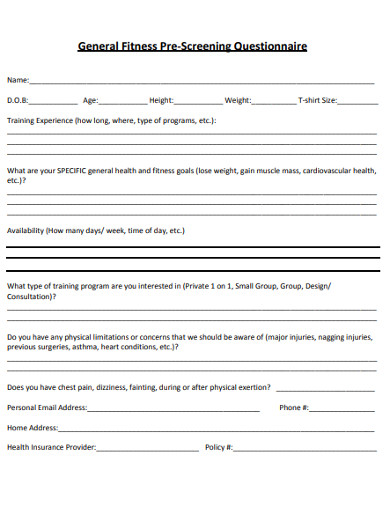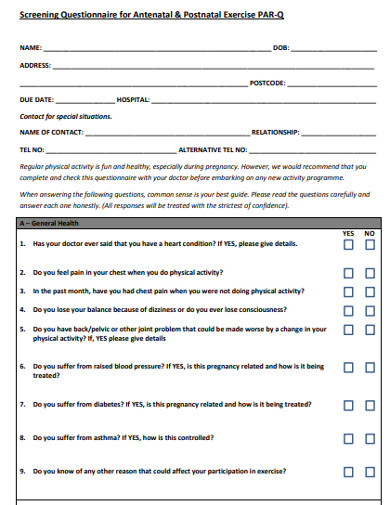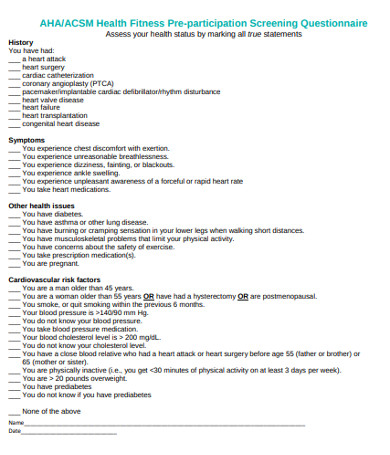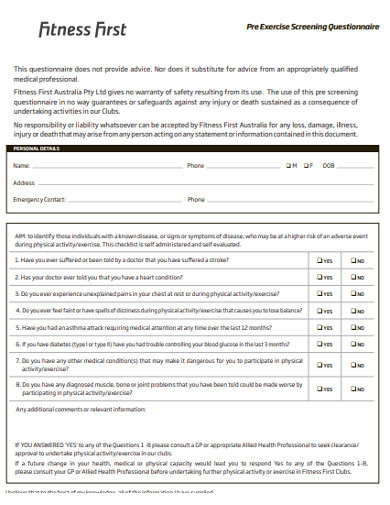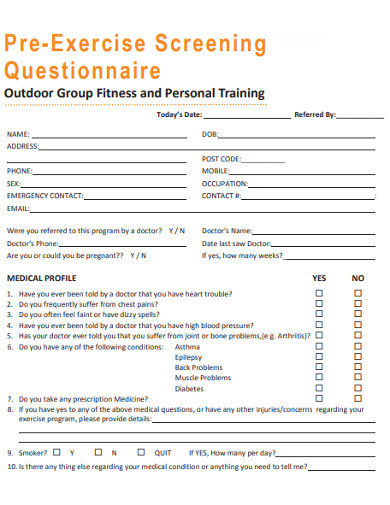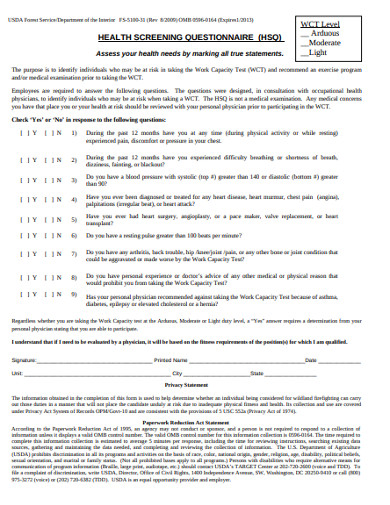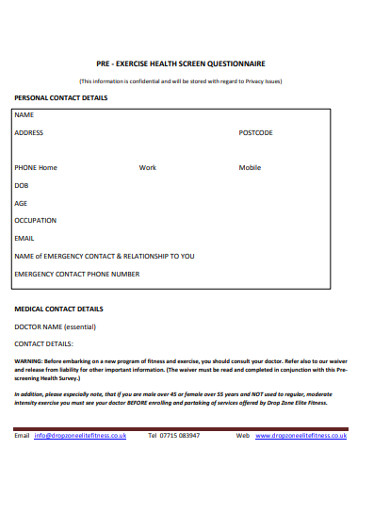11+ Fitness Screening Questionnaire Examples to Download
Some careers demand physical and mental exertion more than other jobs. When occupational hazard is part of the job summary and description, you have to screen the applicants if they are at least at the baseline of what the profession requires. For these kinds of jobs, fitness screening is a necessary assessment step to make sure that the candidates considered are physically and mentally qualified to go through the grind of training and the actual job. Otherwise, the person will harm himself at the expense of your company, institution, or academy.
Physical and mental fitness are a necessary capital and asset for a person to venture into select professions. Fitness can be different things. It can be a person’s physical capacity to perform tasks and fulfill the given conditions. Or it can be his or her intellect and mental prowess. It may just be his or her physique, overall health, or career aptitude. The profession has defined its standard of fitness, and it is for the applicants to live up to the definition. Being fit for a job means the person is capable of managing its physical, mental, and emotional toll that comes with the line of work.
We might have just described a profession or career in your department. When you posted a job opening notice, you might have been greeted with a multitude of potential candidates. Crisp resumes and recommendation letters are helpful in decision-making, but anyone can dazzle you with the perfect-looking resume. They might seem all qualified for the position, but a fit body does not lie. That is why fitness questionnaires have always been a part of the screening process for the kind of professions mentioned previously.
Fitness screening helps you choose promising applicants and evaluate candidates. It measures how fit a person is. The profession’s standard may allow a certain allowance for improvement during training, but you are less likely to accept an asthmatic person for the military. Even if the person seems fit in other areas, cardiorespiratory wellness is critical in passing different endurance exams. Each candidate’s score in the fitness evaluation is compared to the baseline of what it takes to belong to the career or profession. Fitness, after all, can give light to how well the person can execute his or her job functions. Especially when the career revolves around saving lives, the person should do this to the best of his physical and mental capacity.
Physical And Mental Tango
Overall fitness is a choreographed dance between the body and mind. You can’t have one without the other. For physically strenuous jobs, fitness means the person positively response to measures of fitness. These measures usually fall under strength, endurance, cardiorespiratory efficiency, flexibility, and body mass index. For instance, Air Force men and women are in charge of primarily protecting the country’s air space and of disaster relief and rescue missions. They have both humanitarian and combat functions. These people undergo different rigorous training and examinations to be deemed fit for the job. They may need to be issued medical certificates to prove their fitness. However, physical examination isn’t the sole measure of fitness.
Mental fitness describes how well a person can handle his or her emotions, manage stress, and make connections with others. Today, society is starting to give mental fitness the same regard as physical fitness. A person cannot function well for himself or herself and for others when his or her mental faculties are not in the best condition. Doctors need more than intelligence as they go through their stressful daily hurdles in the hospital. They have to treat the hurt and the sick. It can happen that the best interventions cannot rescue the patient. Physicians and other medical professionals have to go through the emotional weight of their patients dying on them. For both professions, physical and mental fitness are a necessity. An air force personnel can also suffer emotional distress during operations, while doctors tend to operate under restless shifts.
11+ Fitness Screening Questionnaire Examples & Templates
With mental health’s significance catapulted beside physical health’s, it is relevant to include this facet of fitness in your health assessment. It is no longer enough to focus on muscle tone and cardiorespiratory efficiency. The person can perform his or her functions better when his or her physical and mental fitness are not mutually exclusive.
While there are already established pillars for physical fitness, the career might have different requirements of mental fitness for the job. It is up to your company or institution to develop your standards for what you consider as acceptable in terms of emotional and psychosocial robustness. To save you half the work for the fitness screening questionnaires, you can select the ideal template for the concerned profession from the following samples. If you decide to adopt the following examples or start from scratch, we got you covered!
1. Sample Fitness Screening Questionnaire Example
2. Basic Fitness Screening Questionnaire Example
3. Formal Fitness Screening Questionnaire Example
4. Fitness Pre-Screening Questionnaire Example
5. Health and Fitness Screening Questionnaire Example
6. General Fitness Pre-Screening Questionnaire Example
7. Fitness Exercise Screening Questionnaire Example
8. Health Fitness Pre-participation Screening Questionnaire Example
9. Fitness Pre Exercise Screening Questionnaire Example
10. Personal Fitness Training Screening Questionnaire Example
11. Sample Health Fitness Screening Questionnaire Example
12. Fitness Pre exercise Health Screening Questionnaire Example
Selection of the Fittest
What are the attributes that you should be sure to include in your fitness evaluation questionnaires? When you choose to start from scratch in preparing the questionnaires, make sure that the following sections are included in the document. You can also modify the template you have to encompass the following:
1. Medical History
The applicant’s personal and family medical history are indicators of his or her overall health and capacity to perform designated functions. This is the first section of the questionnaire. You can use the information indicated here to evaluate the person’s health risks that may hinder a 100 percent performance on the job. The person may also become more of a liability than an asset to your institution. Examples of questions for this section can be about the person’s history of hospitalization, heart attack, anxiety, and asthmatic episodes, surgeries, and lifestyle and hereditary diseases, if any. You can also ask about their lifestyle, habits, and vices, as well as family health.
2. Current Medication
The prescription and non-prescription medication list that the applicant has can tell magnitudes about his or her overall health. For example, the person that takes sleeping pills likely suffers from difficulty sleeping. This condition may be rooted in a more serious problem. Taking anti-depressants indicate that the person may not be mentally fit. Of course, you can still reconsider his or her application but do so knowing the implications of this.
3. Physical Limitations
This section reviews the person’s capacity to work. It could be that he or she has a spinal problem or allergy that will limit his or her performance and range-of-motion. The person may also be too light or heavy, and this might put him or her safety at risk. If the work requires the person to stay for prolonged periods in confined spaces, a person with a larger build might have more difficulty in the task than those with a smaller build. For flight attendants, the height-weight proportion has been a requirement for some time. The reason behind that is that the attendants must be able to reach the baggage bins in the aircraft. You might need the person to see a medical clearance from his or her physician first before considering him or her for the job.
4. Fitness Metric
The fitness screening questionnaire can also be used for the succeeding screening tests. You can prepare for this part by including fitness and performance metrics in the document. The set of fitness tests may vary between different careers. Most likely, the tests will center around strength, endurance, cardiorespiratory wellness, and agility. Strength exercises will test power. Endurance and cardiorespiratory exams measure the person’s physical tolerance to an activity. Agility assessments check for the person’s speed and swiftness to move. Include a list of the tests that the applicant will go through and the metrics at the side of every test. The person can be rated poor, average, or above-average.
5. Additional Health Exams
You might want to consider including additional tests during the screening. Examinations like blood sugar analysis, urinalysis, ketone tests, blood pressure, heart rate, and so forth will also tell a lot about the person’s health. Results from blood sugar analysis and ketone tests, for example, will show his or her risk of developing diabetes. Urinalysis will reveal how well the person’s kidneys function, and if the person is taking certain substances.
6. Applicant Profile
To prevent prejudices and biases, we should place this section on the latter part of the questionnaire. This section will ask for the person’s name, age, sex, and address. Aside from demographic research, the information will also put into perspective the person’s fitness. Here, we also evaluate a person’s muscular and fat composition into four categories: weight, height, body composition, and circumference measurements. The values are the basis for determining if a person is malnourished, average, or overweight. The nutritional status of a person is indicative of his or her health and lifestyle.
7. Waiver or Consent
Perhaps the applicant claimed that he or she is fit and able to undergo physical fitness tests, and it turns out that they are not supposed to perform strenuous activities. Add a consent clause at the end of your fitness screening questionnaire that says the person, having been fully informed of the potential risks of taking the tests, voluntarily took the fitness tests. This section at the end of the form will save you from legal jeopardy when the negligence is not on your end.
Having physical and mental fitness as criteria for accepting applicants in work or the academy is not a discriminatory practice. Fitness screening safeguards the institution’s interest and protects underqualified people from harming themselves in the process. Every candidate considered should be fit to stand the rigors and demands of the profession. In the end, we must prioritize the health and safety of everyone before anything.



